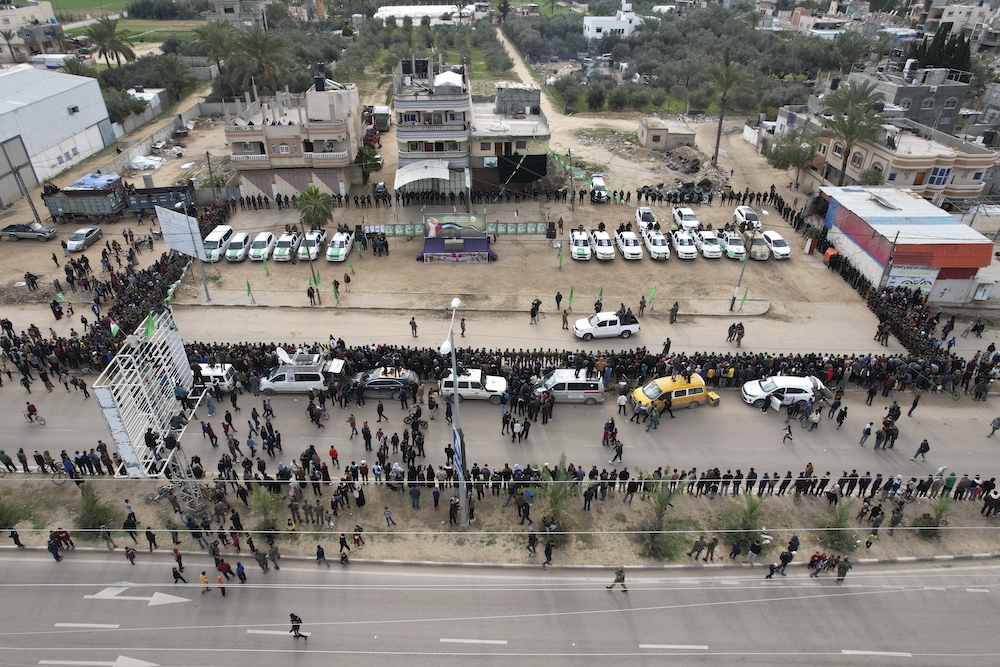JERUSALEM: Thousands of angry Israelis took to the streets on Monday for the third consecutive night to demand Prime Minister Benjamin Netanyahu quit — and the demonstrators say they are not going away.
Mass protests uniting families of the hostages held by Hamas in Gaza and an anti-government street movement that failed to unseat Netanyahu last year brought Jerusalem and Tel Aviv to a standstill on Saturday and Sunday.
As thousands again gathered in Tel Aviv and outside Israel’s parliament in Jerusalem on Monday, several protesters told AFP that Netanyahu has to be forced out “to save Israel.”
“This is an existential crisis for Israel,” said Einat Avni Levi, 40, whose family had to flee from the Nirim kibbutz a little over two kilometers (1.25 miles) from the border barrier with Gaza.
“If someone comes and takes me from my bed, and I can’t trust my army and my government to come and rescue me, I cannot live here,” she said, referring to the around 250 hostages abducted by Hamas during the October 7 attack.
Netanyahu had long argued that he was the only leader who could keep Israelis safe. That claim was shattered by the Hamas attack that took Israel’s much-vaunted security apparatus by surprise.
General Reuven Benkler, 65, who came out of retirement to serve for a month on the Lebanese border, praised the Israeli military’s campaign in Gaza as “phenomenal.”
But he said Netanyahu was “throwing the military success down the drain.
“There is no point in carrying on a war that has no goal. Wars are a diplomatic tool. The only goal of this war is keeping Bibi in power,” he said using Netanyahu’s nickname.
Like many at the protests, which are spearheaded by the hostages’ families and their supporters, he was convinced Netanyahu was not trying to free them.
“There is no way the hostages will come home while he is still in power. He has sacrificed 134 hostages to stay in power,” said Benkler, who leads a soldiers’ group called Gunners for Democracy.
“He doesn’t give a damn about anyone else apart from himself.”
Israel believes about 130 hostages remain in Gaza, including 34 who are presumed dead.
But pressure has been growing on Netanyahu’s right-wing coalition as anti-government protesters and the hostages’ families have found common cause.
But with the country nearly six months into the war in Gaza — where more than 32,845 have been killed, according to the Hamas-run territory’s health ministry — Netanyahu’s supporters say this is not the time to change leader.
“Go home. You are helping Hamas,” an Orthodox Jewish man shouted at protesters walking toward the parliament with banners saying, “Election now!“
Many in front of parliament were angry that Israel’s ultra-Orthodox — who make up nearly one in five of its Jewish population — are mostly excused military service.
General Benkler said it was an “outrage” when Israel “needed every man it can get,” blaming the alliance with ultra-Orthodox parties that has kept Netanyahu in power.
Mother-of-six Tehila Elitzur said religious communities should no longer escape having “to do their duty.”
“I have three reservist sons serving and one in the regular army. And my husband, a doctor, who is 54, is serving right now too.”
But she said that Israel’s fractured society needed to come together or “we will die.”
Netanyahu was “using divisions to stay in power,” she added.
A row over prolonging the exemptions — which technically no longer apply from Monday — is threatening Netanyahu’s coalition government.
Army reservists protested in an ultra-Orthodox neighborhood of Jerusalem on Sunday to demand that religious Jews be made to fight.
But on Monday it was the turn of the ultra-Orthodox — known in Hebrew as Haredim — to vent their anger, with hundreds blocking a major highway in Jerusalem.
Einat Avni Levi said “people have been traumatized” by the October 7 attack when Hamas militants killed 1,160 people in Israel, mostly civilians, according to an AFP tally of Israeli official figures.
But, she said, “you cannot wipe out Hamas” as Netanyahu has vowed to do.
“Hamas is an idea,” he said. “Even if we kill every last Hamas terrorist out there — and we should — the Hamas idea will live on.
“The only solution is a political agreement. We don’t need to be best friends (with the Palestinians), but we do need to live together.”
Demonstrators vow to ‘save Israel’ from Netanyahu in new protests
https://arab.news/mzcej
Demonstrators vow to ‘save Israel’ from Netanyahu in new protests

- As thousands again gathered in Tel Aviv and outside Israel’s parliament in Jerusalem on Monday, several protesters told AFP that Netanyahu has to be forced out “to save Israel”




























